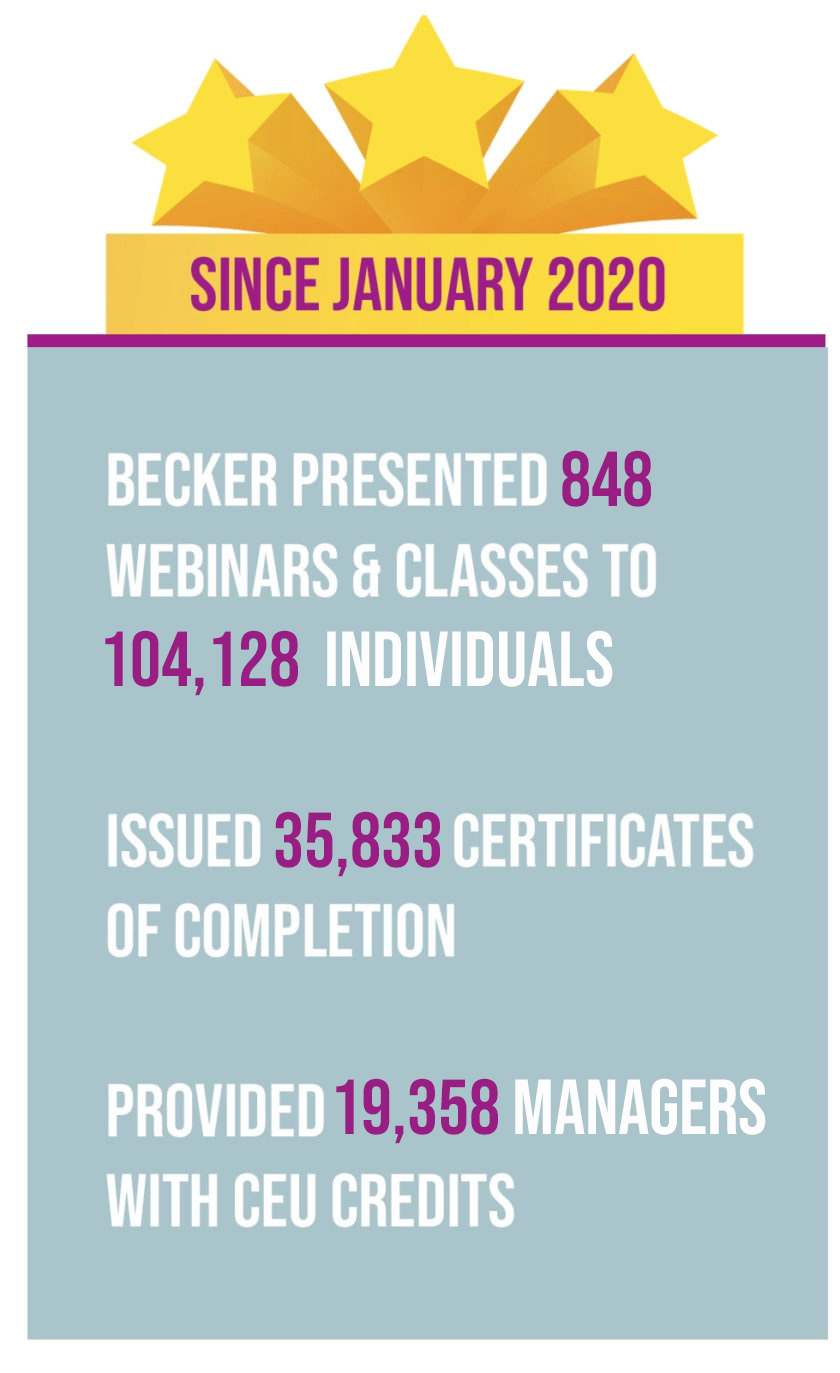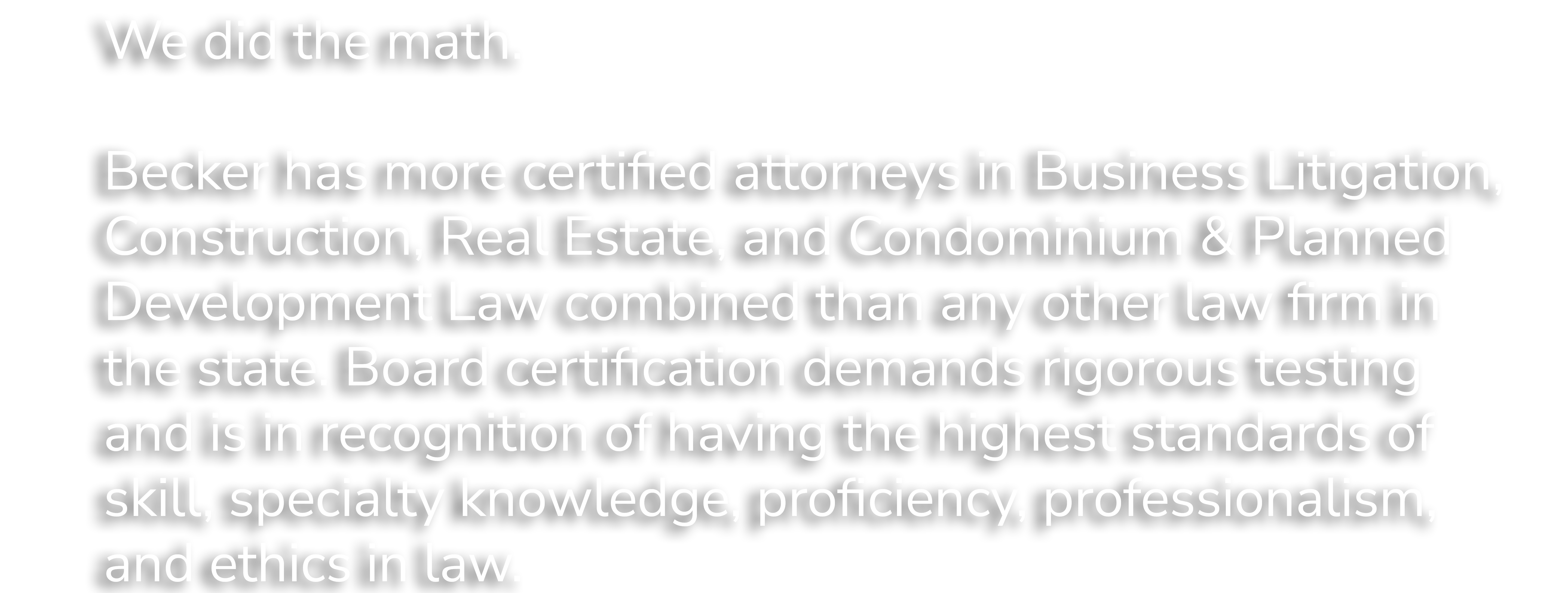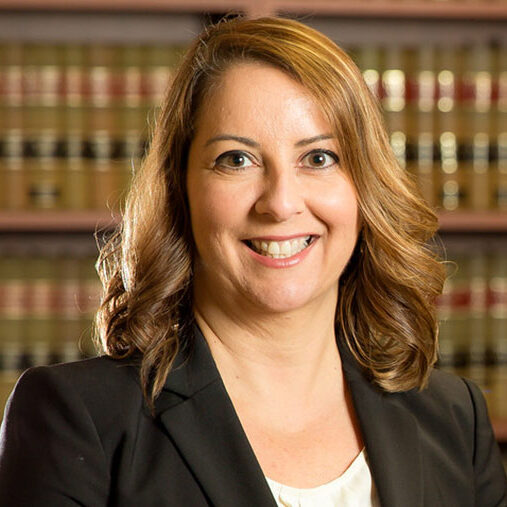WE’VE GOT BIG NEWS!
Eight Former Shumaker Community Association and Litigation Attorneys Join Becker, Expanding Condo, Co-Op & HOA Practice in Tampa
Becker is thrilled to announce that eight community association and litigation lawyers will join the firm in Tampa from Shumaker, significantly strengthening the firm’s Condo, Co-Op & HOA Practice Group and capabilities. The team will be led by Jonathan Ellis, Chair of Shumaker’s Community Associations Practice Group, and Kathleen Reres, Co-Chair of the Practice Group. Shareholder Clinton Morrell, along with five additional attorneys, will also join Becker.
Gary C. Rosen, CEO and Managing Shareholder of Becker said, “Becker has long been recognized as the gold standard in community association law. This talented group of attorneys enhances that legacy and brings an even greater depth of service to our clients in Tampa and beyond.”
In this Issue
As summer approaches, community associations should focus on a few key actions to keep their neighborhoods safe, attractive, and well-managed. From hurricane preparedness and immigration enforcement, to exploring the integration of artificial intelligence, this issue of CUP has something for everyone. Plus, don’t miss the 100th episode milestone of Take It To The Board with industry icon James Donnelly of Castle Group.
Did you know Becker significantly strengthened the firm’s Condo, Co-Op, & HOA practice in Tampa with eight former Shumaker community association and litigation attorneys? The team will be led by Jonathan Ellis, former Chair of Shumaker’s Community Associations Practice Group, and Kathleen Reres, former Co-Chair of the Practice Group. Shareholder Clinton Morrell, along with five additional attorneys, have also joined Becker.
The Marketable Record Title Act (“MRTA”) provides that interests in real property are extinguished after thirty (30) years, with limited exceptions, unless preserved through compliance with Chapter 712. Elizabeth A. Lanham-Patrie emphasizes the critical need for associations to take timely action to preserve these rights and avoid notable consequences in, “Don’t Let Your Covenants and Restrictions Expire, Be Sure to Preserve.”
In a recent CUP article, we examined whether 55+ communities can avoid compliance with federal laws that prohibit discrimination based on age and familial status. But what happens when someone under the age of 55 tries to purchase a unit in one of these condominiums? Can they be disqualified from buying solely because of their age? In this featured video, “The Fair Housing Act: Housing for Older Persons,” Jennifer L. Biletnikoff highlights the crucial distinction between ownership and occupancy in 55+ communities.
For more information on preserving “55 and Older” Communities, check out this episode of Take It To The Board!
Associations may risk losing the right to enforce their governing documents if they apply rules inconsistently, unevenly, or arbitrarily, a concept known as “selective enforcement.” Michelle H. Kaiser explains all is not lost and that your Association, in consultation with its legal counsel, may be able to “reset” the restriction in, “Retaking the Right to Enforce: Explaining the Chattel Shipping Process.”
THIS CASE marks a pivotal advancement in social media ownership jurisprudence by creating a structured analytical framework to determine who rightfully owns social media accounts, particularly when ownership is contested. Joseph Markovich highlights why community associations should implement clear contractual provisions to reduce the likelihood of disputes and protect increasingly valuable digital assets in, “THIS CASE: In re Vital Pharmaceutical.”
Articles
Don’t Let Your Covenants and Restrictions Expire, Be Sure to Preserve
By: Elizabeth A. Lanham-Patrie
The Marketable Record Title Act (“MRTA”) is set forth in Chapter 712, Florida Statutes, and provides that interests in real property are extinguished after thirty (30) years, with limited exceptions, unless preserved through compliance with Chapter 712. MRTA generally does not affect condominium associations and co-op associations (except in limited situations), but it does apply to the covenants and restrictions for most homeowners’ associations.
The Fair Housing Act: Housing for Older Persons
In a recent CUP article, we examined whether 55+ communities can avoid compliance with federal laws that prohibit discrimination based on age and familial status. But what happens when someone under the age of 55 tries to purchase a unit in one of these condominiums? Can they be disqualified from buying solely because of their age? In this featured video, “The Fair Housing Act: Housing for Older Persons,” Jennifer Biletnikoff highlights the crucial distinction between ownership and occupancy in 55+ communities.
Retaking the Right to Enforce: Explaining the Chattel Shipping Process
Generally speaking, an Association may lose its right to enforce its Governing/Condominium Documents if it does so inconsistently, unevenly, or arbitrarily. This is a concept known as “selective enforcement” and is shown when there are instances of similar violations, of which the board had notice but failed to act. When “selective enforcement” is demonstrated, the Association is said to be “estopped” from enforcing the given restriction.

In re Vital Pharmaceutical
652 B.R. 392 (2023)
By: Joseph Markovich
THIS CASE marks a pivotal advancement in social media ownership jurisprudence by creating a structured analytical framework to determine who rightfully owns social media accounts, particularly when ownership is contested. Complications arise when accounts are created in one person’s name but for the benefit of an entity, or when accounts are managed by employees on behalf of employers. In these scenarios, courts look beyond the act of account creation to determine the intended owner.
The case involves Vital Pharmaceuticals, Inc. (“Vital”), a Chapter 11 debtor, which filed an adversary complaint against its former CEO, John H. “Jack” Owoc, and his wife, Megan E. Owoc, who was the former Senior Vice President of Marketing. Vital sought a declaration that the rights to three social media accounts created by the Owocs while employed by the company were property of the bankruptcy estate and requested turnover of these accounts. The social media accounts in question were used to market Vital’s products and included the company’s brand name in their handles.
The court established a new test focusing on three factors: documented property interest, control over access, and use of the accounts:
- The legal test for ownership of social media accounts begins with the application of traditional property ownership principles, such as a contract between the parties. When such documentation exists, it creates a presumption of ownership that guides the court’s analysis. The court cites several examples, including a social media platform’s terms of service, employment agreements, and social media policies.
- If a documented property interest exists, the presumption of ownership can be overcome by showing that a different party has exclusive control over access to the social media account. This factor examines which party maintained actual control over the account, including login credentials and management authority.
- If neither a documented property interest nor exclusive control over access is established, then the court must consider the actual use of the account. This final factor examines how the account was actually employed – whether primarily for business purposes or personal use.
The court found that neither party could establish a documented property interest or exclusive control over access to the accounts. However, the evidence showed that the accounts were pervasively used to market Vital’s products, with nearly seventy-five (75%) percent of the posts being explicit or implicit marketing for Vital’s energy drinks. The court concluded that the pervasive use of the accounts for marketing Vital’s products, along with other factors, meant that Vital owned the rights to the accounts. The court granted summary judgment by separate order in favor of Vital, declaring that the rights to the social media accounts were property of the bankruptcy estate and ordering the Owocs to turn over the accounts to Vital.
Ownership and control of neighborhood social media accounts created for community associations will likely depend on similar factors, including who created the account, the purpose of the account, and whether it is officially recognized or governed by the association. If the account is created by the association or its board members in their official capacity, it will likely be considered an asset of the association and subject to its governance. However, if a resident creates the account independently and without authorization, ownership and control may rest with the individual creator, unless the association can establish a legal claim to the account based on its use or representation. In such cases, the association may need to take legal action to address any misrepresentation or misuse.
Perhaps the most actionable takeaway from THIS CASE is the emphasis on documented property interests as a factor in determining ownership. While the case does not explicitly address website ownership, the principles and factors considered by the court – such as control, purpose of use, and the documented property interest – could potentially be used to resolve disputes over website ownership. The applicability of these principles would depend on the specific facts and circumstances, as well as any relevant contractual or legal documentation. The court’s framework suggests that entities, including community associations, should implement clear contractual provisions regarding social media account and website ownership to reduce the likelihood of disputes and protect increasingly valuable digital assets.
QUESTION OF THE MONTH
Q: In the back of my mind, I recall the board, about 10 years ago, filed some sort of “affirmation” of the governing documents. I cannot seem to find the law that tells how often this happens. Is it every 10 years? 30 years? Some other interval? In 2015, when this was done before, the documents were recorded with the County Recorder’s office.
Miami Herald Op-Ed: In South Florida, When Ice Comes Knocking, How Should Your HOA React?
In her recent op-ed for the Miami Herald, Donna DiMaggio Berger addresses how homeowners associations (HOAs) should respond to immigration enforcement actions. Drawing on her extensive experience in community association law, DiMaggio Berger provides guidance on navigating the complex legal and ethical considerations that HOAs may face when dealing with such sensitive situations.
Ronald Perl Receives Community Associations Institute’s Distinguished Service Award
Becker is pleased to announce that Ronald Perl has received the prestigious Distinguished Service Award from Community Associations Institute (CAI) at their 2025 CAI Annual Conference and Exposition: Community NOW. The Distinguished Service Award, CAI’s most prestigious recognition given periodically to an individual for long-standing, extraordinary contributions to CAI and the community association way of life.
Best Practices for Integrating AI in Florida Community Association Management
FLCAJ Magazine
By: Florence King
Today, our world is hugely inundated with the use of artificial intelligence (AI). On a personal level we see this in our use of our smartphones and other technologies to access information either through social media or asking “Siri,” “Alexa,” or “Google” for answers, or in the use of services such as ChatGPT to generate sophisticated, human-like responses to questions posed. The benefits of AI are not just limited to personal use. Although it may not be as visible, AI is used in many industries such as fast food, transportation, health, and entertainment. Therefore, it is not a surprise to see the use of AI in the community association industry as well.
Community association boards and managers should ensure that their communities have adequate disaster planning measures in place as hurricane season approaches. To help you in weathering the storm, check out Becker’s Hurricane Guide which provides important tips and information to help protect your community.
For more information, contact your Becker attorney.
CALLING ALL BOARD MEMBERS AND COMMUNITY MANAGERS
As leaders in Community Association Law, we not only helped write the law – we also teach it.
Did you know Becker provides over 200 educational classes per year throughout the State of Florida on a variety of topics ranging from board member certification to compliance, and everything in between? Our most popular classes are now available online! To view our entire class roster, visit: beckerlawyers.com/classes
For questions regarding our Classes, please see our FAQ page here.
Hurry! Board Certification Deadline – June 30th
If you are a board member of a condominium association that was elected or appointed prior to July 1, 2024, and haven’t taken the 4-hour board certification course yet, please note that the upcoming deadline of June 30th is fast approaching.
As a service to the community, Becker offers the 4-hour course complimentary to clients and charges a $25 processing fee for non-clients. To take our Board Certification class and/or to see the full roster of all of our online course offerings, click here.
Can They Do That?
Becker’s “Can They Do That” video series tackles some of the unique problems that homeowners and renters face today. We answer your questions, no matter how far-fetched they may seem. From service animals to nudists in your community, we get to the bottom of it and let you know – “Can They Do That?”
Becker Steps Up to the Mic with Podcast,
‘Take It To The Board with Donna DiMaggio Berger’
Think you know what community association life is all about? Think again. Residents must obey the rules, directors must follow the law, and managers must keep it all running smoothly. Take It To the Board explores the reality of life in a condominium, cooperative or homeowners’ association, what’s really involved in serving on its board, and how to maintain that ever-so-delicate balance of being legally compliant and community spirited. Leading community association attorney Donna DiMaggio Berger acknowledges the balancing act without losing her sense of humor as she talks with a variety of association leaders, experts, and vendors about the challenges and benefits of the community association lifestyle. Don’t have a streaming app? You can now find all episodes on YouTube! Click here to listen now.
RECENT EPISODES:
-
- Life on The Other Side – A Resident’s Candid Take on Condo Living and Community Governance
- Important Insights from Florida’s Former Condominium Ombudsman
- A Primer on Mixed-Use Communities and Condo Hotels with Becker Attorney Allison Hertz
- Diving Into the Developers’ Mindset with Becker’s Jennifer Bales Drake
- To Rise Above–How Home Elevation Is Changing Flood Protection
- Beyond Condos –The Cooperative Ownership Model, with Becker’s David Rogel
- From Paper to Digital– Revolutionizing Association Document Management, with Trish Mackie-Smith, Co-Founder of Inndox
- Every Drop Counts– Why Your Building’s Water Quality Matters More Than You Think
- Take It To The Board’s 100th Episode Milestone— From Building Castle Group to Industry Icon: A Conversation with James Donnelly
- Beyond the Boardroom: Eastern Medicine for Western Problems, with Dr Tai Johnson
Take It To The Board’s 100th Episode Milestone— From Building Castle Group to Industry Icon: A Conversation with James Donnelly
In this special 100th episode of Take It To The Board, we’re excited to welcome back our very first guest, James Donnelly. When host Donna DiMaggio Berger first sat down with James in 2021, he was leading Castle Group, one of Florida’s largest community association management firms. Now, they reunite to reflect on the extraordinary journey James has taken since selling the company. Together, they explore the motivations behind his decision, the carefully crafted four-year succession plan that ensured Castle’s continued success, and the passion projects that are now shaping his next chapter.
Common Association Official Records Pitfalls
FCAP Managers Report
By: Howard J. Perl
Over the last five (5) years the legislature has put much more emphasis on owner access to official records and penalties against associations and board members for failure to comply with same. This has been in reaction to a few cases, most notably in Miami-Dade County, where violations of current official record requirements facilitated fraud and abuse by some board members.








